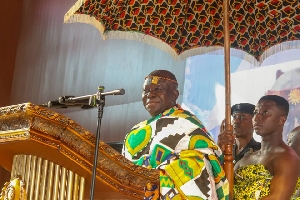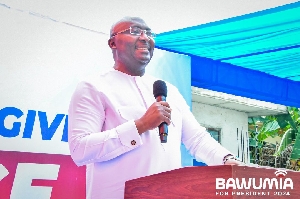Opinions of Wednesday, 23 February 2011
Columnist: Tsikata, Prosper Yao
Reflections On Ethics of Journalism
- By Prosper Yao Tsikata -
There is no doubt that “Ethics of Mass Media and Society” is an important building block in the profession of journalism that introduces learners to making ethical decisions in the practice of Journalism. The gamut of ethical issues - truth, privacy, responsibility, monetary considerations and, recently, the effects of the internet, among others - underscore this assertion. This invariably implies that the profession of Journalism, like many other professions, hinges on these core values. The ability of the journalist to grasp these values and apply them in his or her daily practices goes a long way to define his or her quality of work, steer him or her, as much as possible, from ethical controversies, and differentiate his or her work from the rest.
To begin with, it is obvious that the expanding frontiers of journalism have flung the doors widely opened to anyone with basic computing skills who can write and publish his/her own stories and news to assume the role of a journalist. This is reflective in the “eleven layers” of citizen journalism identified by Friend – participatory journalism, grassroots or bottom-up media, or user-generated or citizen-created content, to mention but a few (2007). With the desire towards participation among ordinary citizens in creating their own stories and news on the rise, there is a “fundamental realignment” in the way news is created, disseminated and consumed, as pointed out by the BBC’s Richard Sambrook. “Internet technology has empowered anyone with a computer to create a media outlet with a potential audience of millions.” (Friend, 2007, p. 13).
While Friend (2007) points out that many practitioners of new media invoke its inherent limitations and distorted evolution, along with the unprecedented ability of the Internet to engage readers, as good reasons for rethinking journalistic conventions for a new century, there is evidence of a move away from objectivity in its truest form as it applied to the traditional media. Alex Jones, director of the Joan Shorenstein Center on the Press, found that most bloggers disdain objectivity and the ethics of the profession as outdated and hypocritical (Friend, 2007).
Obviously, the ethical considerations which in their own rights have legal ramifications in the era of traditional media are in a flux. Typically, issues that might not “pass the heavy lenses” of editors into print, for their ethical quandary with legal consequences, are easily making it into online media. A good example will be an individual’s health record which requires confidential handling finding its way online from a website with doubtful backgrounds. Assuming the information is true, it still leave myriad of questions about credibility of origin which will have implications for responsibility in the event of publication. The point is that the Internet has almost effaced the time and space limitations of the traditional media, making the application of ethics as they applied and continue to apply to the traditional media difficult - the old ethical considerations in Journalism are in flux and unable to answer some of the ethical dilemmas of the new media.
Impersonation, use of pseudonyms, and other forms of faceless writings provide information on both private individuals and public figures which may be accessible on the internet. Assuming, as a Journalist, I receive an email from a faceless source providing detailed information about the health of a public figure, which largely proved to be accurate, the dilemma remains that this faceless source may remain faceless and elusive. This might be problematic when this information turns out to be false and one has to account for any publication emanating from this source.
Similarly, with an army of cookies on the internet, there is the possibility of tracing sensitive pieces of information relating to individuals health on the internet. This might be as a result of their own use of the facility, leaving trails that could be put together to create a picture about them. The point is that the internet has, to a large extent, effaced most of the privacy concerns associated with the traditional media. For this reason, it is important for the journalist to understand these dynamics to know his responsibility and culpability in matters of this sort. My final thoughts on this issue are that ethical issues in journalism have never been static and will continue to evolve with the times. It is therefore incumbent on the journalist to be circumspect with their doubtful sources.
The watershed is that, professional journalists must observe the “rules of the game,” so to speak, with regards to “best practices and principles of traditional journalism”. Upholding the standards will differentiate the work of the professional journalist from citizen journalists. This is not to hold breath for citizen journalists who may be unaware of some of the ethical issues, but to emphasize that journalist owe it a duty to his or her own conscience and to the judging public that for the maintenance of standards.
Zeroing in on the health of the individuals, I have come to the understanding that the health of an individual is not absolute all time. There is always some relativity to the health of the individual. This might make it difficult for the journalist to put a finger on a person’s health with somewhat absolute declaration in a news report. But I also think that states/countries can take up the challenge to categorize some forms of illnesses that might be considered unfavorable for the highest of the land, the presidency - illnesses that might impede the functioning of a sitting president in the discharge of his or duties. The issues enveloping the discovery of the ill-health of the late Nigeria leader, Umaru Musa Yar’ Adua, and how the issue was handled in the media points to the foregoing.
A healthy individual at one point, as a private citizen, may fall ill as a president. The question relating to when it is appropriate to declare or make known the ill-health of the president and other public figures, and of what forms of ill-health may fall under “the need to know” will linger on. These questions can only be answered by constitutional provisions which might empower journalist to speculate and demand to know the truth. Even where these requirements are explicitly stated in the constitution, it is obvious that individuals within the inner circles of high-profile public officers will play the “hide and seek” with journalist in their quest to know the truth. Resorting to John Stuart Mill’s, the lesson is that “if the opinion is right, the people may be deprived of the opportunity of exchanging error for truth; if wrong, they lose what is almost as great a benefit, the clearer perception and livelier impression of truth, produced by its collision with error,” therefore what a journalist sincerely holds to be the truth must go out to the public (Overbeck, 2009).
Another point worth mentioning is the issue of responsibility. From even the long held values of responsibility among Christians, we find a defining perspective. That perspective is that a news report or a story emanating from the stroke of the pen of a journalist remains his/her product, and he/she is in control as the master of that product. Since the interplay between his or her intellect, knowledge and will culminates in the report, it is his or her report forever (Fagothey, 1972). The implication is that there is the need for some amount of circumspection in what we decide to publish, since we will be accountable for our actions not only to our own conscience, but to our friends and the judging public.
Whereas this might look like a “damp” on the fearlessness that is required from the journalist in the discharge of his journalistic responsibilities, there is room for rehabilitation. My understanding is that where the journalist gets it wrong and goes ahead with a publication that is injurious to an individual’s reputation, apologies are appropriate. This must be noted as different from a journalist purposefully spreading falsehood as a way of pandering to the public.
Based on my experience and exposure to available literature on issues relating to ethics, I have come up with a 4-house clearing steps to a story, report or news. First and foremost, the value of truth is preponderance to evidence. In reporting issues that are controversial and concern high-profile public figures, sources are as expansive as the Internet and the issues themselves. This includes contacting the individual (s) involved in the issues and checking with them or their inner circles.
The filtering process: This is the second process toward publishing a report, news, or a story. The first phase within this stage involves matching the facts of the case in a logical sequence of occurrence of events, individuals involved, comparing dates, financial figures, if there are any. This should help draw a complete picture of the story, and where there is a missing tooth of the jigsaw, then a story is passed to another journalist to find answers to the missing tooth. If it passes the first phase of the filter, it is then put through the crystallizing evolution. This process considers whether there are any personal considerations, be it financial or political, in the story which outweighs reporting the truth. If the story fails this test, meaning there is some personal interest, the case must be dropped. If there is none, the case progresses to the final stage of the crystallizing process. This is the glass door where the story is crystallized. This is where the question of whether I will like to be identified with the story as the master of that product comes in. Once I am comfortable stamping my will on the case, it goes through the glass door and become the product of my will and intellect.
Disgorgement forms the last stage of my ethical considerations. This simply refers to other facts that may emerge after publishing news or a story. Like the refund of funds acquired unethically, the journalist is under obligation to withdraw a story, news or a report that turn out to be untrue, and offer the necessary apology to the affected person in the most sincere manner as a way of rehabilitation.
In conclusion, it is evident from the discussion that as technology, media laws, and government regulations are fettering or unfettering the media landscape rapidly and incorporating new issues, much greater responsibility is shifted to the professional journalist to be circumspect. Circumspection, therefore, resides in being abreast with the ethical issues of the field.
Bibliography
Fagothey, A.S.J. (1972, 5th ed.). Right and reason: ethics in theory and practice. Saint Louis:
The C.V. Mosby Company
Overbeck, W. (2009). Major principles of media law. Boston: Wadsworth
Singer, J. & Friend, C. (2007). Online Journalism ethics: traditions and transitions.
New York: M.E. Sharpe












